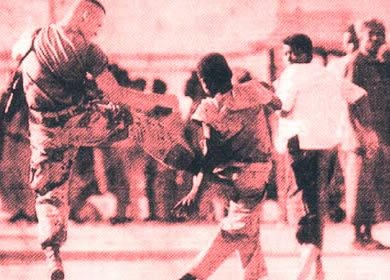Tovarish
Banned
- Joined
- Jul 6, 2013
- Messages
- 417
- Reaction score
- 54
- Gender
- Undisclosed
- Political Leaning
- Undisclosed
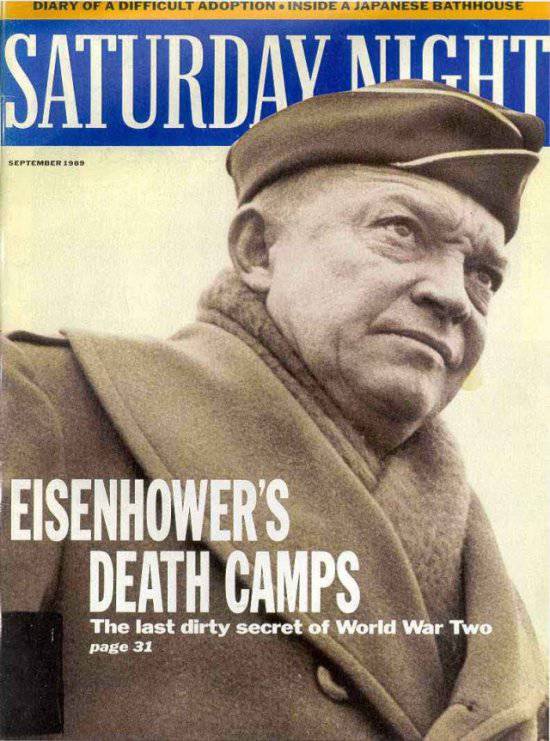
In the spring of 1945 Adolf Hitler's Third Reich was on the verge of death being ground up by the Red Army, advancing westwards towards Berlin and the American, British and Canadian armies under the command of General Dwight Eisenhower, advancing to the east of the Rhine.
Among the first prisoner of war the U.S. was Corporal Helmut von Liebig, who served in antiaircraft in the experimental group, Peenemunde on the Baltic Sea. Liebig was captured by the Americans on April 17 near Gotha in central Germany. Forty-two years later, he distinctly remembered that the camp Gotha was not even awnings, a barbed-wire fence around the field, soon turned into a swamp.
The prisoners received on the first day a small portion of food, but on the second and subsequent days it was cut in half. To get it, they were forced to run through the formation of soldiers. Hunched over, they ran between the rows of American guards who beat them with sticks as they approach to food. April 27 they were transferred to the American camp Heidesheim, where for several days there was no food at all, and then only slightly.
Under the open sky, starved, tortured by thirst, people began to die. Liebig counted daily from 10 to 30 bodies that were dragged out of his section "B", which contained about 5,200 people. He saw the prisoner scored another to death because of a small piece of bread.
One night, when the rain came, Liebig said that the walls of the hole dug in the sandy ground to cover, hit the people who were too weak to get out from under them. They suffocated before it could come to the aid of their comrades ...
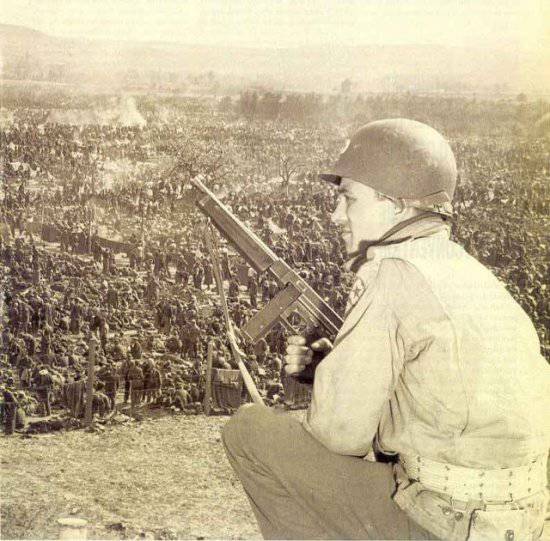
Five days after the surrender of Germany on May 13, Liebig was transferred to another American POW camp, Bingem-Rudesheim in the Rhineland, near Bad Kreusnach. The prisoners held there 200 - 400 000, without a roof over their heads, with little or no food, water, medicines, in terrible distress.
Mortality in the American camp for German prisoners of war in the Rhineland, according to the testimony of the surviving medical service, was about 30% in 1945. Average death rate among the civilian population of Germany was at the time of 1-2%.
One day in June, through hallucinations, Liebig saw "Tommy" included in the camp. The British took the camp under his protection, and it saved the life of Liebig. Then it at 5 feet 10 inches weighed 96.8 pounds.
According to the stories of ex-prisoners Reinberg, the last action of the Americans, before the arrival of the British, was plowing one section of the camp bulldozed, many weakened prisoners could not leave their holes ...
According to the Geneva Convention, prisoners of war were guaranteed three important rights: they need to be fed, and posted to the same standards. as winners, they should be able to send and receive mail, and that they are required to attend the International Committee of the Red Cross, which should be secret reports on the conditions of the Indemnified Parties.
(In the case of Germany, as her government was dissolved in the latter stages of the war, was appointed by the Indemnified Parties Switzerland).
In fact, the German prisoners were denied by the U.S. Army in these and most other rights of a series of special resolutions and directives adopted her command at SHAEF - Supreme Headquarters, Allied Expeditionary Force
"God, I hate the Germans" - Eisenhower wrote to his wife Mamie in September 1944. Earlier, he told the British ambassador in Washington that all the 3500 German General Staff officers must be "destroyed." In March 1945, in a letter to CCS, signed by Eisenhower recommended the creation of a new class of prisoners - Disarmed Enemy Forces - DEF, which, unlike the prisoners were not covered by the Geneva Convention. Therefore, they should not have been supplied with the winning army after the surrender of Germany.
This was a direct violation of the Geneva Convention. In a letter dated March 10, in particular. the reasoned: "The additional load on the supply of troops caused by the recognition of the German Armed Forces of Prisoners of War, which requires them to provide a basic level of troop diet goes far beyond the capabilities of the Allies, even with the use of all the resources of Germany." The letter concluded: "It takes your approval. Plans will be drawn up on this basis."
April 26, 1945 approved the Joint Command of the status of DEF for prisoners of war in the hands of the U.S. Army: British commanders refused to accept the American plan for its prisoners. CCS has decided to keep the status of disarmed German troops in secret.
At the same time, Eisenhower's chief quartermaster at SAEF, General Robert Littlejohn, has already halved the diet for prisoners and an SAEF, addressed to General George Marshall, Chief of the U.S. Army, signed by Eisenhower, says that in the camps, the prisoners will not be "neither roof nor other facilities ... ".
However, the reason there was no supply. In Europe, the warehouses were plenty of suitable materials for the construction of camps for prisoners of war. Adjutant General Eisenhower on specific issues, General Everett Hughes visited the huge warehouses in the NNS and Marseilles and reported: "Pripasov more than we can ever use. Extend within sight."
The camp Rheinberg, where Corporal Liebich broke in mid-May, dying of dysentery and typhoid, was not at the opening on April 17 at no food for the prisoners. As in other camps, "Floodplain Rhine", opened by the Americans in mid-April, there was no guard towers, no tents, no barracks, no kitchen, no water, no toilets, no food ...
George Weiss, tanks repairman, who now lives in Toronto, says about his camp on the Rhine: "All night we had to sit close to each other. But the lack of water was the worst. According to three and a half days we do not have water at all. We drank their own urine ... "
The camp Reinberg thousands of displaced civilians were Germans. There were children six years, pregnant women and elderly people over 60. In the beginning, when the camp were still trees, some began to tear off limbs and make a fire. Security ordered the fire put out. At many sites were forbidden to dig holes in the ground to cover. "We were forced to eat grass"
WORKING team stripped from the corpses of identification tags, stripped them and stacked layers, sprinkling lime.
Conditions in the U.S. camps along the Rhine in late April were checked by two colonels of the Medical Corps of the U.S. Army James Mason and Charles Beasley, who described them as in a newspaper published in 1950: "huddling behind barbed fencing in a pile for warmth, they are terrifying: about 100,000 sluggish, apathetic, dirty, emaciated people with blank stares, dressed in field gray uniforms with mud, standing ankle-deep in mud ...
The commander of the German Division reported that people did not eat for at least two days, and the water supply was a major problem - at 200 yards proceeded full-flowing Rhine. "
4 мая 1945 первые немецкие военнопленные, принадлежащих американцам, были переведены в статус DEF.Since then, the American prisoners camps officially lost the opportunity to visits by independent observers as well as the possibility of obtaining food parcels, clothing or medicines from a humanitarian organization.
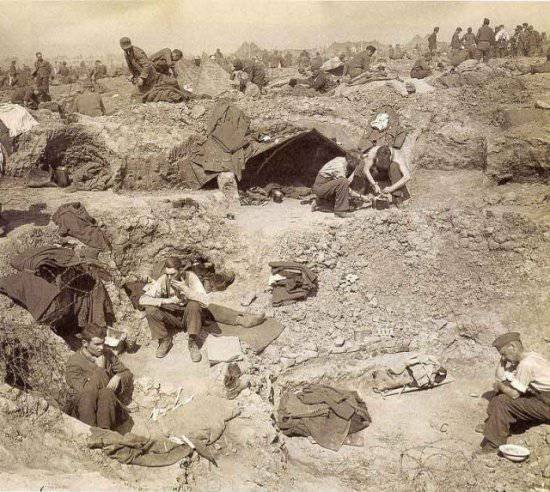
At least 800,000, it is very likely more than 900 000 and it is possible that more than 1 million deaths in American and French camps than were killed in the north-western Europe from the time America entered the war in 1941 to April 1945.
An excerpt from the memoirs of Johann Baumberger, a German prisoner of war
Europe
Johann Baumbergers war memories
In this aerial photograph each black dot means a German prisoner sitting in a snowy field in a month.
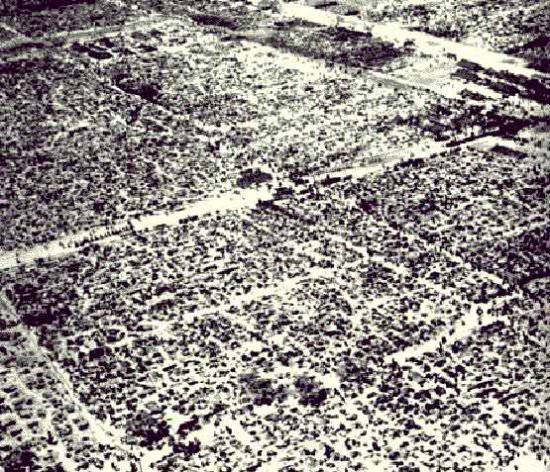
In "Eisenhower"s Death Camps": A U.S. Prison Guard"s Story the7thfire.com/Politics%20and%20History/us_war_crimes/Eisenhowers_death_camps.htm
At the end of March - beginning of April 1945, I was sent to guard a POW camp near Andernach on the Rhine. I had four courses of German, and I could talk to the prisoners, though it was forbidden. But over time, I became a translator and I was asked to identify the members of the SS. (I did not find any).
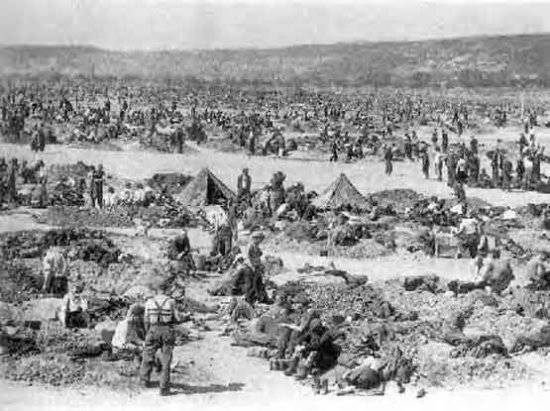
In Andernach about 50,000 prisoners were kept in the open field, fenced by barbed wire. The women were kept in a separate pen. We concluded there was no shelter, no blankets, many did not and coats. They slept in the mud, the rain and the cold, among the incredibly long trenches for excrement. The spring was cold and windy and suffering from the weather was awful.
Even more horrible to watch how the prisoners were boiled in tins like thin soup made of grass and weeds. Very soon, the prisoners were exhausted. Dysentery raged, and soon they were sleeping in their own excrement, too weak and crowded to get to the trench-toilets.
Many begged to give them food, wilting and dying before our very eyes. We had plenty of food and other food, but we could do nothing to help them, including health care.
Enraged, I protested to his officers, but was received with hostility or bland indifference. Under pressure, they replied that they fulfill the strictest instructions "from the top".
Turning to the kitchen, I heard that kuhmeysteram strictly forbidden to share provisions of prisoners, but it more than ever and they do not know what to do with it. I promised to give off little by little.
When I threw food to prisoners through the barbed wire, I was caught by the guards. I repeated the "offense" and the officer angrily threatened to shoot me. I thought it was a bluff, until I saw on the hill near the camp officer, shot from a pistol .45 caliber group of German civilian women.
To my question, he replied: "Shooting at targets" and continued to burn until the last bullet in the store. I saw a woman running for cover, but because of the range is not able to determine whether someone has wounded officer.
Then I realized that I was dealing with a cold-blooded killer, full of moral hatred. They considered the Germans subhuman, worthy of destruction: another round of downward spiral of racism. All press the end of the war was full of pictures of German concentration camps with emaciated prisoners. This increased our self-confident cruelty and facilitated us to behave in such a way that we were sent to fight ...
Why the American media do not tell about it? Heh-heh.
Last edited:




